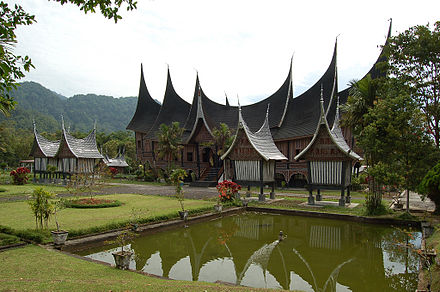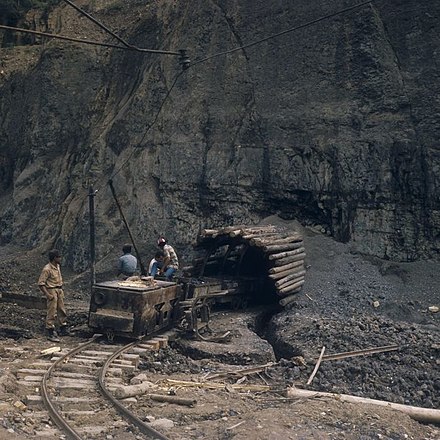West Sumatra - province of Indonesia, on the island of Sumatra
West Sumatra (Sumatra Barat) is in Sumatra, Indonesia.
Cities
- Padang — Indonesia's capital of spicy food
- Bukittinggi — A mild weather city, to run away from the heat
- Padang Panjang — A pleasant market down near Bukittinggi
- Pariaman — The Sunset Beach City
- Sawahlunto — Little Holland of Sumatra
- Batusangkar — The Heart of Minangkabau culture and spirit
- Payakumbuh — Land of Rocky Mountains
- Koto Gadang — source of silver, and some national government leaders.
- Solok — Land of 1,000 lakes
Other destinations
- Bungus Bay
- Cubadak Island — 75 minute boat ride from Padang
- Harau Valley — Rice fields dwarfed by cliffs.
- Lake Maninjau
- Mentawai Islands — surf's up
- Pasaman (Regency) — The wild life paradise at West Sumatra
- Sikuai Island — 45 minute boat ride from Bungus Bay harbor
Understand
 West Sumatra bounded in the north by the province of North Sumatra, in the west by the Indian ocean, in the south by the provinces of Bengkulu and Jambi, and in the east by Riau province.
West Sumatra bounded in the north by the province of North Sumatra, in the west by the Indian ocean, in the south by the provinces of Bengkulu and Jambi, and in the east by Riau province.
85% of the population are Minangkabau, notable in anthropology as the world's largest matriarchal society: children take their names from their mother's side and, on marriage, the husband moves into the wife's family. Culturally, the hallmarks of Minangkabau culture are their famously spicy food, served all around Indonesia in Padang restaurants (named after the capital), and the soaring-eaved rumah gadang house, shaped like a series of buffalo horns.
On the other hand, the tribal inhabitants of the Mentawai archipelago, a group of islands about 160 km off the coast of west Sumatra, cling to a traditional agrarian lifestyle that is different from that of Minangkabau.
Talk
Most people in West Sumatra use the Minang language in their daily conversation. It's somewhat similar to Malay.
Get in
By plane
Minangkabau International Airport (Bandara Internasional Minangkabau - BIM) (IATA: PDG), located 23 km north-west of Padang, is the main gateway to West Sumatra, with frequent flights to destinations throughout Sumatra and Java, as well as Kuala Lumpur (AirAsia).
Get around
The best views in West Sumatra are north of Minangkabau International Airport such as Lake Maninjau and Bukittinggi. Use rental car without driver is maybe the best alternative. The rental car can be hired at the airport with price about Rp 50,000 more than if hired in Padang (about 45 minutes drive to the south), but maybe hired the car in the airport is more practical. Toyota Avanza is Rp 300,000 for 24 hours.
Other ways to reach Bukittinggi could be done with DAMRI buses for Rp25,000 from the Airport, Tranex minibuses, online ride-hailing apps such as Gojek or Grab, or use the official taxi ranks such as Bluebird for a much expensive price (about Rp250,000 - Rp300,000, depending on traffic as well) but can get you directly to the destination safely. Avoid illegal taxis/car rentals with a driver that can charge you more than a normal taxi.
See
Mining heritage
 West Sumatra, more specifically the area between Bukittinggi and Sawahlunto, is home to a world heritage site named Ombilin Coal Mining Heritage of Sawahlunto. It's made up of train stations, a coal mine, a coal processing plant and such places related to the coal mining history in the area.
West Sumatra, more specifically the area between Bukittinggi and Sawahlunto, is home to a world heritage site named Ombilin Coal Mining Heritage of Sawahlunto. It's made up of train stations, a coal mine, a coal processing plant and such places related to the coal mining history in the area.
Itineraries
Padang is not a tourist city and so it is better to sleep in Bukittinggi, 90 km from Padang. Bukittinggi is a small city that covers 25 km<sup>2</sup>, about 900 m above mean sea level and with temperatures ranging from 16 to 25<sup>o</sup>C; it is suited for walking, although it is sometimes hilly. Public transport is available, as are Bendi horse-carts. The Sianok Canyon and Japanese Caves are the best for trekking.
Historic house museums
- Tan Malaka's Birth House and Museum, -0.087139°, 100.419083°.
- Rumah Gadang Tuanku Lareh.
Do
In West Sumatra its not easy to get off the tourist trail without language, the hotel performances are pretty contrived sometimes.
If you can, get down to Padang Panjang 10 km downhill from Bukittinggi en route to Padang, the capital (Padang is a bit boring but has a huge market complex for last minute purchases before flying out).
Traditional Performance
- Randai (traditional drama) is a type of traditional drama, mixed with dance based on silek (Minangkabau martial art), story and music.
- Saluang (traditional flute) is traditional music performance.
- Silek (traditional martial art) is a Minangkabau martial art (in Malay/Bahasa Indonesia : silat).
Festivals
Tabuik is the local manifestation of the Remembrance of Muharram among the Minangkabau people in the coastal regions of West Sumatra, particularly in the city of Pariaman. The festival includes reenactments of the Battle of Karbala, and the playing of tassa and dhol drums. Tabuik is also the term used to refer to the high funeral biers carried around during remembrance procession. Originally this was a Shi'a festival, but nowadays, most Muslim and even non-Muslim inhabitants participate in Pariaman and other areas where similar Tabuik festivals are held. The tabuik itself is made from bamboo, rattan and paper. During the week of Tabuik many activities are held including kite races and traditional plays such as Tari Piring. The remembrance draws a large crowd including dignitaries such as the provincial governor, to see the tabuik in the morning before it is slowly taken to the beach. After the tabuik are thrown into the sea, many people go swimming looking for souvenirs of the tabuik to keep.
Buy
Eat
West Sumatra is a great place for lovely food, and its cuisine is one of Indonesia's best. Water buffaloes are a symbol of West Sumatra and are used in rendang, a rich and spicy buffalo meat or beef dish. Padang food comes from West Sumatra. The Padang food restaurant chains can be found throughout Indonesia and neighbouring countries. Dishes from the region include nasi kapau which is similar to Padang food but uses more vegetables. Ampiang dadiah (buffalo yogurt with palm sugar syrup, coconut flesh and rice) and bubur kampiun (Mung bean porridge with banana and rice yogurt) are other west Sumatran specialties. They have a lot of hot & spicy dishes, since chili is in the majority of their food. Curry is also a big part of their dishes, and quite a few use coconut milk. All of the traditional food is Halal, due to the Islamic faith of the community.
Although West Sumatra is not as devout as Aceh, Ramadan is strictly observed, such that all food stalls and restaurants including non-Muslim ones are closed from 04:00 to 16.00 every day from 2-3 days before the fasting month to 2-3 days afterwards. However, in big hotels, you can order food at normal hours as a guest of the hotel.
Drink
- Teh Talua is a West Sumatra's provincial drink. If you've chosen a more set up cafe stall ask for a teh talua. Don't grimace - bitter black tea poured over whipped egg and sugar creates a custardy flavoured "cappuccino froth" on your tea. The best has a squeeze of lime.
- Jus Pinang is made from betelnut or areca nut (Areca catechu) young fruit mixed with spices and whipped egg and tea. People in Minangkabau believe this beverage can make you fit.
- Skotang or Sarobat is a beverage consisting of ginger mixed with other spices. Minangkabau people generally stopped drinking alcohol after they became Muslims hundreds years ago. This beverage is a substitution for alcohol, and is usually available at night.
- Daun Kawa (Coffee leaves) is from Minangkabau. This drink is made from dried coffee leaves. Traditionally it was kept in bamboo and poured into tempurung kelapa (a coconut shell) as a cup.
Sleep
Stay safe
Safer than most Sumatra areas because of a Muslim ethic and intact social fabric. Keep safe by making friends at there. The Minang community is having a great responsibility, talk to people and they will look out for you as one of their own. However, crime does exists and so the usual precautions should be taken. Most importantly, respect their values and ladies should not travel alone after dark, although getting accompanied by other women is OK. The thing is, the community can't look after you if you don't look after yourself or if you go places where the honest eyes can't see. So being alone or the only female in male group at night is basically asking for a trouble.